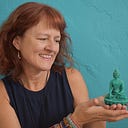Why I Teach Banned Books
Today, my local paper had not one but two stories about attempts to ban books in my county’s public schools and libraries.
My Facebook feed has been filled with the subject as well, which makes sense as many of my friends are teachers and professors. One friend posted a list of banned books, which made me realize that I am currently teaching two banned books and another that is considered challenged.
As a college professor teaching adults, the issue of banned books doesn’t affect my teaching.
As a parent, I’ve wrangled with the issue of what I felt was appropriate for my daughter to read. When she told me in fifth grade that The Hunger Games books were available for free reading time in her classroom, I groaned inwardly. I’d never read them because the premise was so disturbing. I had no interest in reading about children killing each other, and I didn’t particularly want my then ten year old reading about that either.
But it never occurred to me to tell the teacher to remove the books. I also didn’t forbid my child from reading them. I asked her to wait a bit longer so I could do some research, and then, though I would not have done so otherwise, I started reading The Hunger Games so that I would be able to talk with her about them and address any concerns or difficult feelings that would arise for her (or me!) as she read.
The series went on to be one of her favorites. We own all of the books and movies, and she has read and watched them multiple times. We’ve had amazing conversations about oppression, exploitation, and courage, which is good because we live in a world that has oppression and exploitation and requires courage.
Currently, I’m teaching an entire class devoted to Harry Potter. We’re watching two films and reading five books. (We hope to hit the theme park if Covid calms down enough.) Though I know why some parents don’t want their children to read Harry Potter and respect their right, I don’t understand it. The books have been proven to increase empathy for children who do read them and have messages of friendship, compassion, sacrifice, and acceptance. Put into one word, the theme is love.
In another class, I’m teaching the dystopian novel The Giver. This book differs from The Hunger Games in that the dystopia is subtle. When we meet 11-year-old Jonas, he is unable to find a word for what he is feeling, which is perfectly normal, but it becomes clear that there is a lot at stake in finding the right word as this is a world that requires precise language that hides the truth of the underpinning horrors that everyone ignores unquestioningly.
Questions are why I teach banned books. In the first book of the series, Harry Potter is stuck living with his oppressive (here’s oppression again) muggle (non-magical) aunt and uncle and is told repeatedly and abusively to stop asking questions.
The job of education, though, and of reading, is to teach us to ask questions. Without questions, we get the aforementioned oppression and exploitation. Without questions, everything that seems normal, as in The Giver, can actually be dystopian.
When I looked at the list of banned books my friend posted on Facebook, I tallied up how many I had read, which was most, and I didn’t enjoy all of them. I had started a few and put them down because they made me too uncomfortable. I had deliberately chosen not to read some. But I did all of the above with deliberation, making a conscious choice.
Obviously, children can’t approach literature with that same studious decision making, but we can guide them in that decision making rather than refuse them options.
Or, I assure you, the kids are going to do what my first-ever Harry Potter students in 2013 did. They regaled me with stories of homemade book covers and whatever it took to get their dose of magic when told they couldn’t read the series as children.
The Hunger Games teaches children that rebellion is sometimes necessary. Harry Potter teaches them that rule breaking when the rules are wrong is a good idea. The Giver asks what we are willing to give up in order to have complete order.
These banned books create critical thinkers unwilling to entertain oppression or exploitation of themselves or others because, thanks to experiencing them, these readers also have empathy.
I’m going to keep teaching banned books and encourage students to ask the hard questions because book banning is a tool of oppression.
